When it comes to launching an ecommerce business, Shopify is a household name. Shopify has been around since 2004 and is often the first solution that one might hear or think of when thinking of a platform to sell on.
However, as with any major decision, it’s worth considering alternatives, and in 2024, there are many–especially if you’re thinking about selling digital products.
Without further ado, here are 10 Shopify alternatives to consider for your business.
Shopify Alternatives Overview
| Ecommerce Platform | Best For | Pricing |
|---|---|---|
| Whop | Buying and selling digital products | Free signup + 3% transaction fee |
| Shift4Shop | Online stores of any size | Starting at $29/month, up to $299/month, Enterprise plans start at $2,000/month |
| BigCommerce | Scaling ecommerce businesses | Starting at $39/month, Plus and Pro plans $79/month and $299-$399/month respectively |
| Squarespace | Portfolios or simple sites | Ecommerce plans start at $18/month |
| Wix | Beginner landing pages | Starting at $16/month, increasing to $59/month |
| Thrivecart | Cart optimization | 495 for basic lifetime access, $690 for Pro lifetime access |
| WooCommerce | Turning sites into online stores | Free to download, paid plugins for increased capability |
| Sellfy |
Selling physical products |
Starting at $19/month, increasing to $99/month |
| Clickfunnels | Creating conversion funnels | $97/month for starter plan, $297/month for platinum plan |
| Samcart | Simplifying the sales process | Starting at $49/month, increasing to $199/month |
10 Best Shopify Alternatives- Pros, Cons, and Features
🏆1. Whop
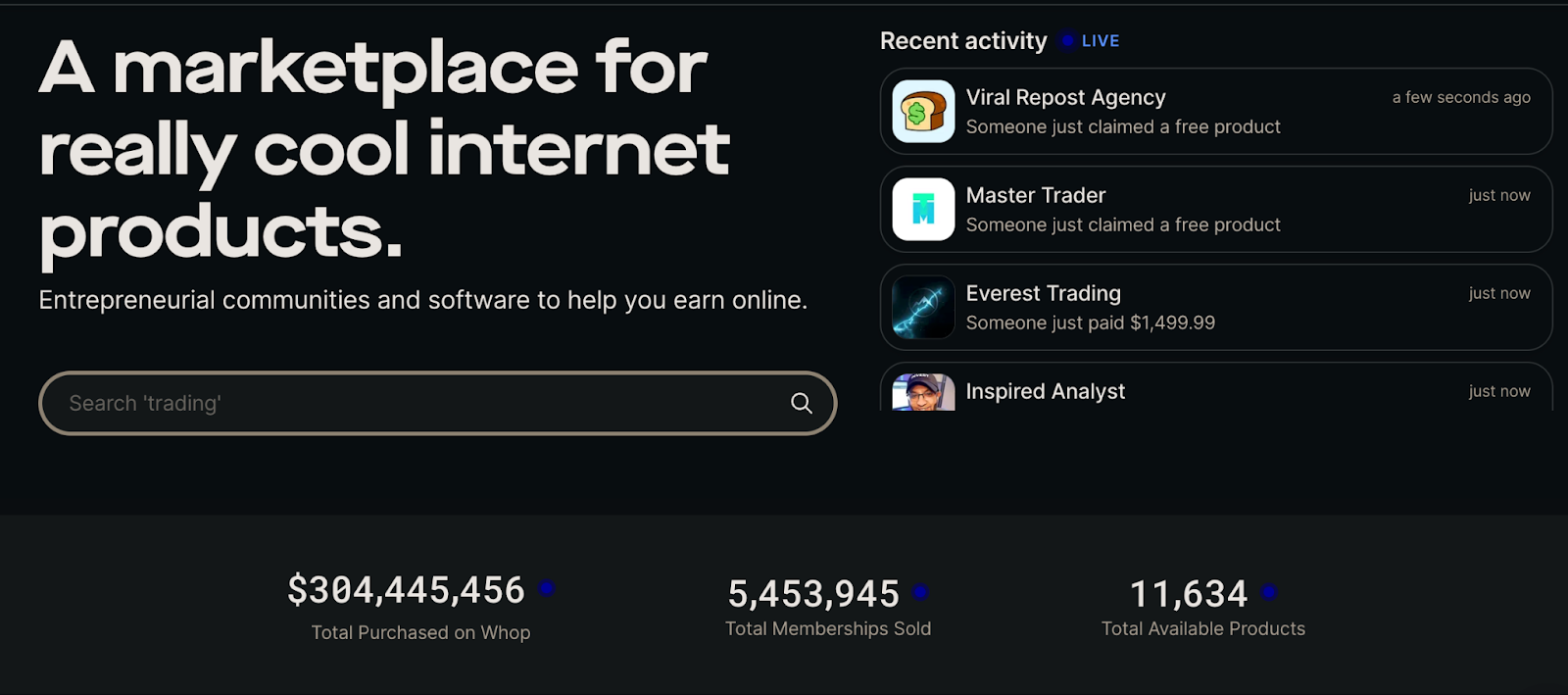
Whop started out as a top marketplace for buying and selling private Discord memberships, and while that is still one of the platform’s main offerings, it’s now home to digital products of all kinds.
It has grown immensely in its popularity thanks to how easy it is to launch a store there and how active the marketplace is.
Signing up is totally free, and during the process, you will be walked through each step with the ability to access world-class support along the way to ensure success when your store goes live.
Whop is known for its powerful and user-friendly dashboard, high-converting sales pages with multiple payment methods that benefit both the seller and the buyer, and a strong reputation for being home to the highest quality digital products.
Additionally, Whop has a powerful and easy-to-integrate API that you can use so you can integrate payment with existing software
You won’t have to worry about any monthly subscription fees–the platform is free to use forever, with industry-leading transaction fees that you’ll only pay out of the sales revenue that you generate.
Whop is continuing to grow and become a household name, with many sellers choosing to sign up to or switch to sell on Whop as their go-to solution as an ecommerce platform.
Whop Pros:
Can sell a diverse set of digital products and software to an active targeted marketplace, intuitive and helpful dashboard, top-notch 24/7 customer support and an easy-to-integrate API.
Whop Cons:
Its marketplace can be competitive in certain categories, so a high-quality offering is needed to gain customers.
Whop Pricing:
Free to sign up + 3% transaction fee, with discount for higher volume sellers.
2. Shift4Shop
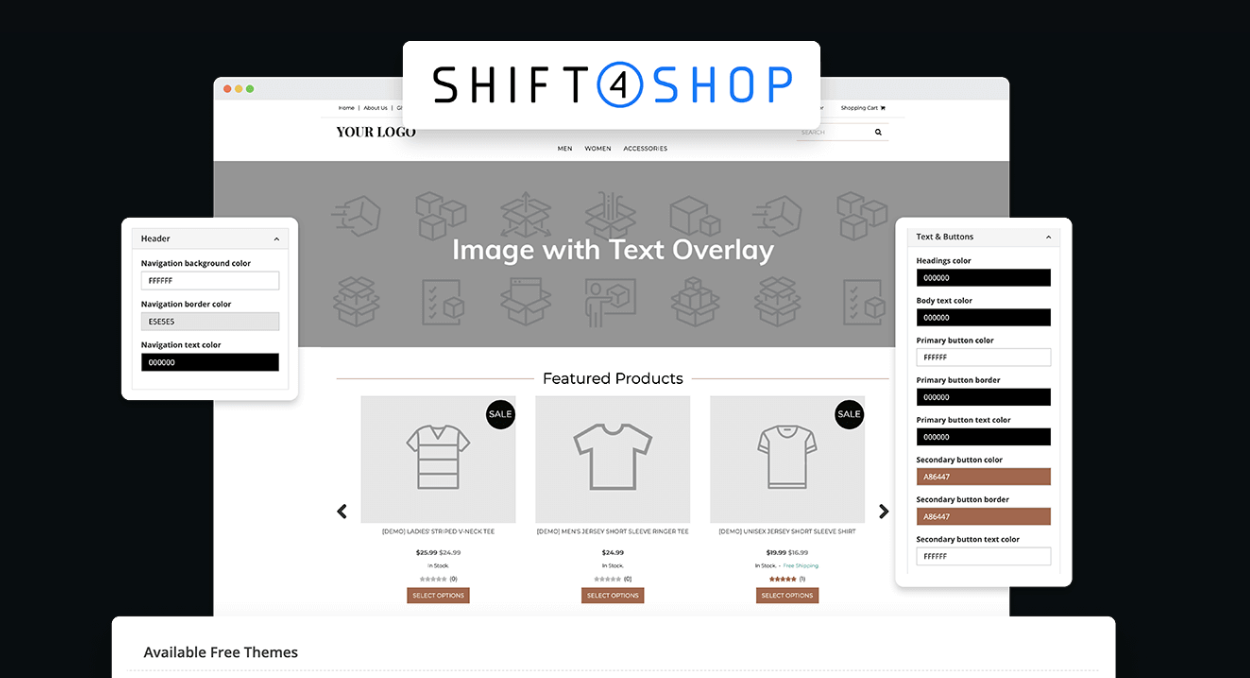
Shift4Shop was made to be a solution for online stores of any size, known for its library of over 100 themes and a drag-and-drop HTML editor that allows a store owner to create a store that fits their brand.
While there are many free themes to choose from, if you want a premium theme, you’ll have to pay up to $199.99 for a ready-built structure to host your store on.
The platform also offers the ability to create a blog section complete with SEO structures so that you can publish articles for content marketing that will allow you to rank in the search engines.
You can add unlimited products without any additional pricing, and the pricing only increases as you scale the revenue of your business.
Shift4Shop Pros:
Large library of themes, including those that are both free and paid, in addition to a drag-and-drop builder that makes it easy to customize the look of your store. Ability to add an SEO-friendly blog.
Shift4Shop Cons:
Accurately designing exactly what you want your store to look like can become confusing and costly. Pricing can get quite high if you end up scaling.
Shift4Shop Pricing:
Starting at $29 per month and up to $299 depending on the size of the store. Enterprise-level plans start at $2,000 per month.
3. BigCommerce

BigCommerce is a powerful platform designed to support ecommerce businesses that are looking to scale with low fees, or for those already at enterprise levels. The platform offers a range of advanced tools such as checkout customization which allows users to curate every step of the customer journey in their store.
Any store modifications are meant to be friendly to those who don’t know how to code, complete with intuitive page builders for making changes.
BigCommerce allows for multiple storefronts under a single plan. You can also choose to accept payments in different currencies, which can allow you to easily test different markets and scale globally. Although you have to pay a membership fee to use it, the platform is best known for not having additional transaction fees beyond those associated with payment processing.
BigCommerce Pros:
Can create multiple storefronts even with the most basic plan, complete with the ability to accept multiple currencies. No additional transaction fees.
BigCommerce Cons:
Pricier than competitors, using all of its extensive features can prove to have a steep learning curve, especially for beginners.
BigCommerce Pricing:
$39 monthly for the most basic plan, with $29 per month only possible if paid annually upfront. Plus and Pro plans are $79 per month and $299-$399 per month respectively.
4. Squarespace

Known for its design-centric out-of-the-box store themes, Squarespace caters to those who are more visually inclined.
While the platform is known mostly for creating In addition to providing a simple yet effective suite of design tools, the platform includes built-in SEO features. Other features include branded email campaigns and social media integrations and custom domains.
The platform has built-in ecommerce features, but compared to other solutions, it’s clear that the site was not made with ecommerce in mind and is better off as a good looking site for someone who wants to showcase a personal brand or portfolio.
Squarespace Pros:
Great design with little to no need for customizing in order to make a store that is highly visually appealing. Good value for a basic ecommerce store.
Squarespace Cons:
Not ecommerce focused, better for a portfolio or simple site.
Squarespace Pricing:
Ecommerce plans start at $18 per month, with increases for higher tiers with more capabilities and features.
5. Wix

Known to be incredibly easy to use for the non-technical, Wix is a beginner-friendly website builder that has recently integrated ecommerce capabilities for those wanting to launch an online store with it.
Its simple to use, drag-and-drop interface can be used with its library of hundreds of different templates that are all free for paying users. However, further customization beyond the themes often requires coding knowledge, and even then the functionality is limited compared to other alternatives or custom solutions. Wix is great for beginners who have smaller stores and don’t necessarily want to scale.
It also offers custom domains and blog creation.
Wix Pros:
Simple to quickly launch a basic website complete with a store, and hundreds of free themes and templates to choose from.
Wix Cons:
Customization for both design and ecommerce functionality can become complicated.
Wix Pricing:
Starts at $16 per month, with plans increasing to $59 per month or more based on bandwidth and features.
6. Thrivecart
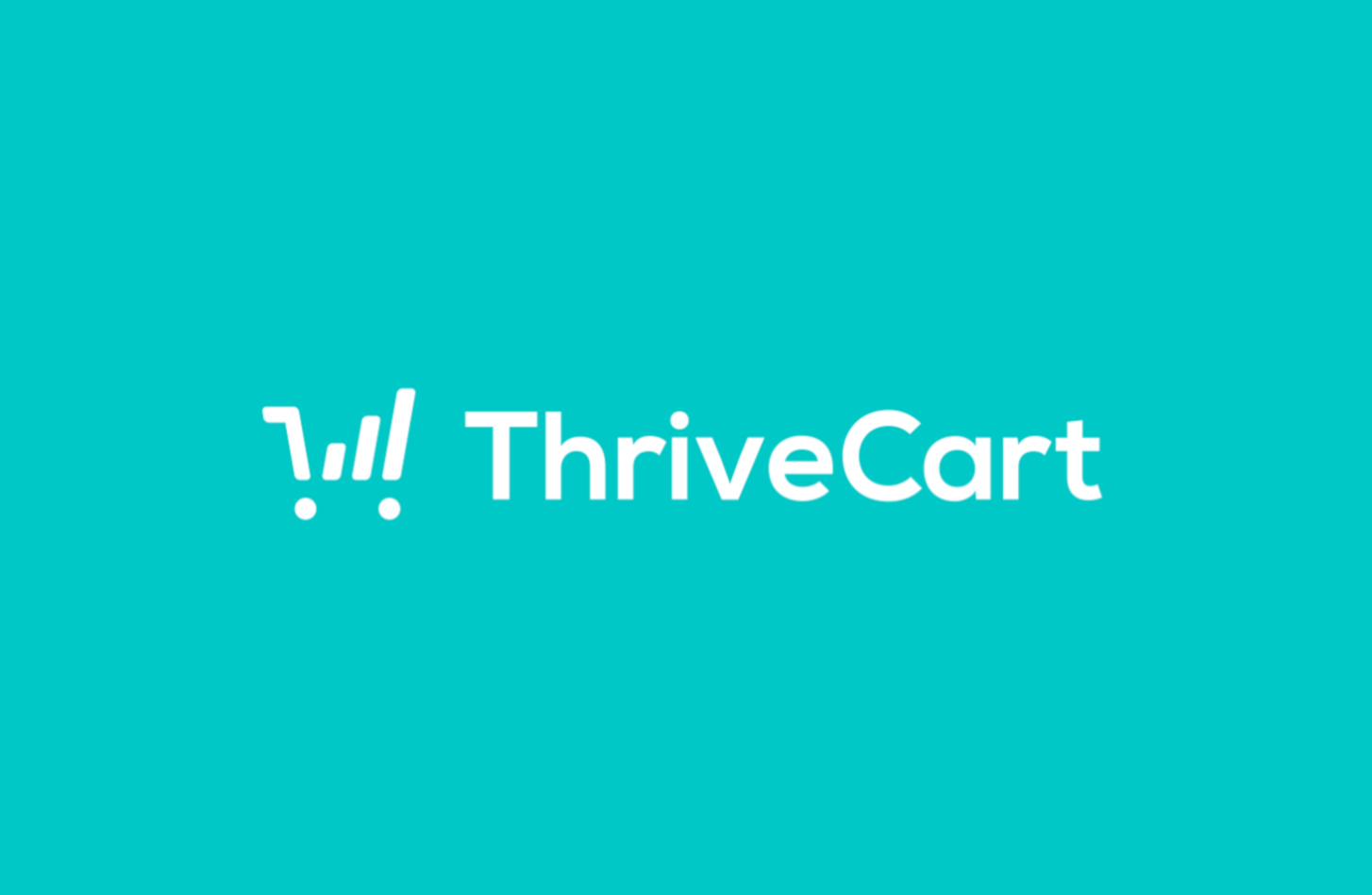
One ecommerce solution that was created with shopping in mind is ThriveCart. As its name states, its main focus is a specialization in cart optimization, with a focus on maximizing conversions and customer order value with high-converting checkout pages and funnels.
Thrivecart is not a comprehensive ecommerce platform, rather, it is a shopping cart that is meant to be integrated with an existing platform. Compatible integrations to platform include Teachable and Wordpress via Woocommerce.
Features include bump offers, one-click upsell, and abandoned cart recovery. Users can create and split-test different flows and automations to maximize conversions and sales.
ThriveCart Pros:
Laser-focused on conversion rate and average order value, which is great for increasing profits of an already existing business.
ThriveCart Cons:
Not a full online store platform and needs to be integrated with another platform, also it’s typically not worth using until one has an established business. Expensive one-time fee.
ThriveCart Pricing:
$495 for basic lifetime access, $690 for Pro lifetime access.
7. WooCommerce

Woocommerce is a paid ecommerce plugin that is built on top of Wordpress, which is the CMS that powers a good fraction of many popular websites today.
Although it is free to use, the checkout designs are hard to customize and often limited to the design and theme of the current Wordpress site.
It is open source, so many additional plugins have been made by third parties that allow one to customize its limited default capabilities. Woocommerce also offers its own library of paid extensions and plugins. However, these additions can be quite expensive.
One of its biggest flaws is the lack of solid customer support, as support tickets are often diverted to a support forum that is not incredibly active and sometimes isn’t helpful.
Woocommerce Pros:
Easy to integrate with Wordpress with a free download, good basic capabilities and design.
Woocommerce Cons:
Severely lacking in customer support. Need to purchase additional add-ons and plugins from potentially unreliable third parties. Need to have Wordpress in order to use.
Woocommerce Pricing:
Free to download and use with an existing Wordpress site, paid plugins for increased capability.
8. Sellfy
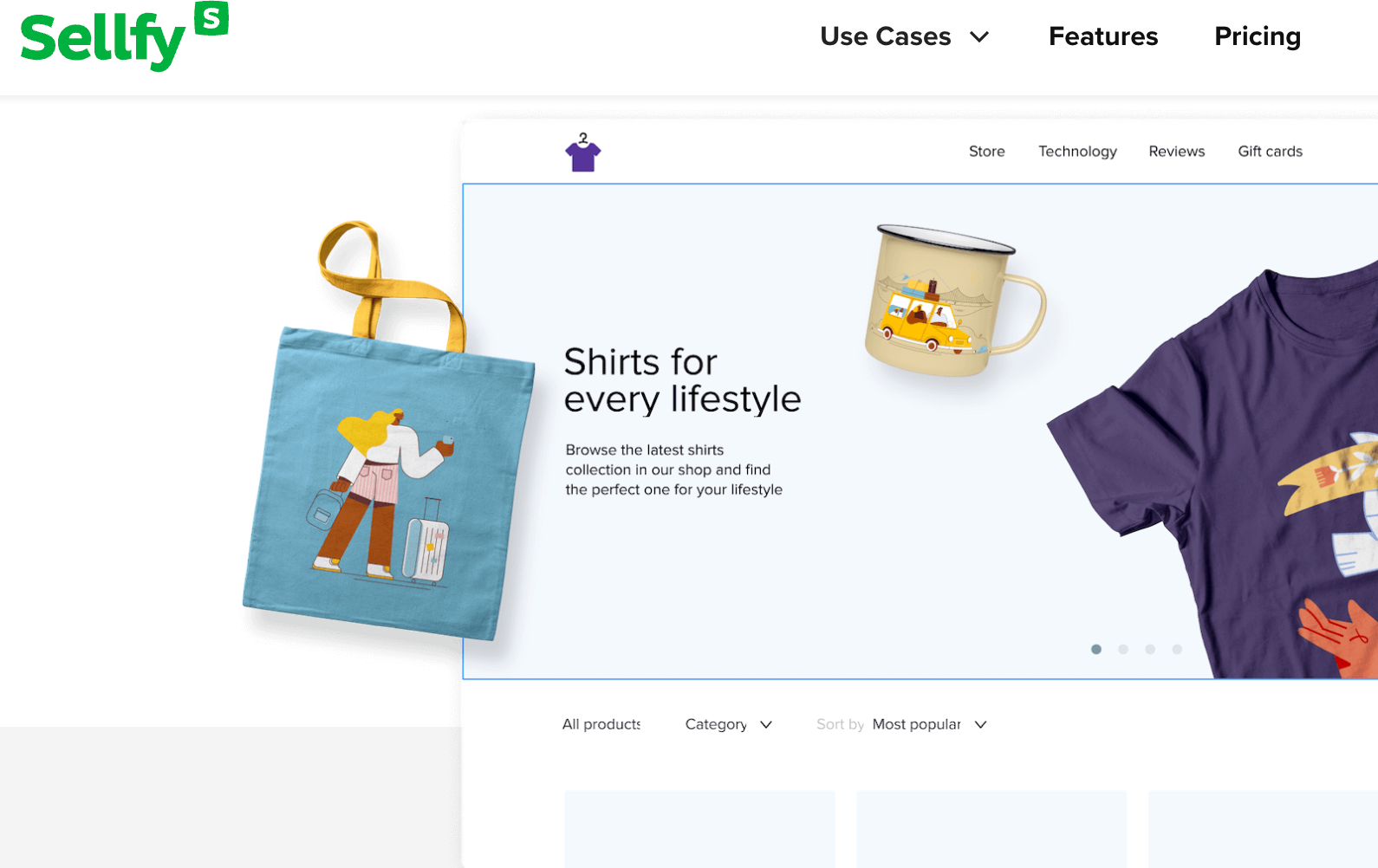
Sellfy is a modern ecommerce platform made to sell anything, from physical items to digital products, including subscriptions. It offers a streamlined solution that is meant to get new sellers started quickly.
The platform also allows for embedded buy buttons that can be used on existing sites or even social media profiles for those that simply want to use their checkout rather than full solution.
An additional perk of the platform is the support of print-on-demand, with a built in solution for those who want to use this in their business model.
However, although Sellfy is easy to use and launch something quickly, customization options and depth are limited.
Sellfy Pros:
Easy to quickly launch a storefront on an existing website or to get customers through social media with a simple buy button and checkout page.
Sellfy Cons:
Limited customization and its simplicity lacks advanced functionality even for more expensive plans.
Sellfy Pricing:
$19 per month for a basic starter plan, with business and premium plans costing $49 and $99 per month respectively.
9. Clickfunnels
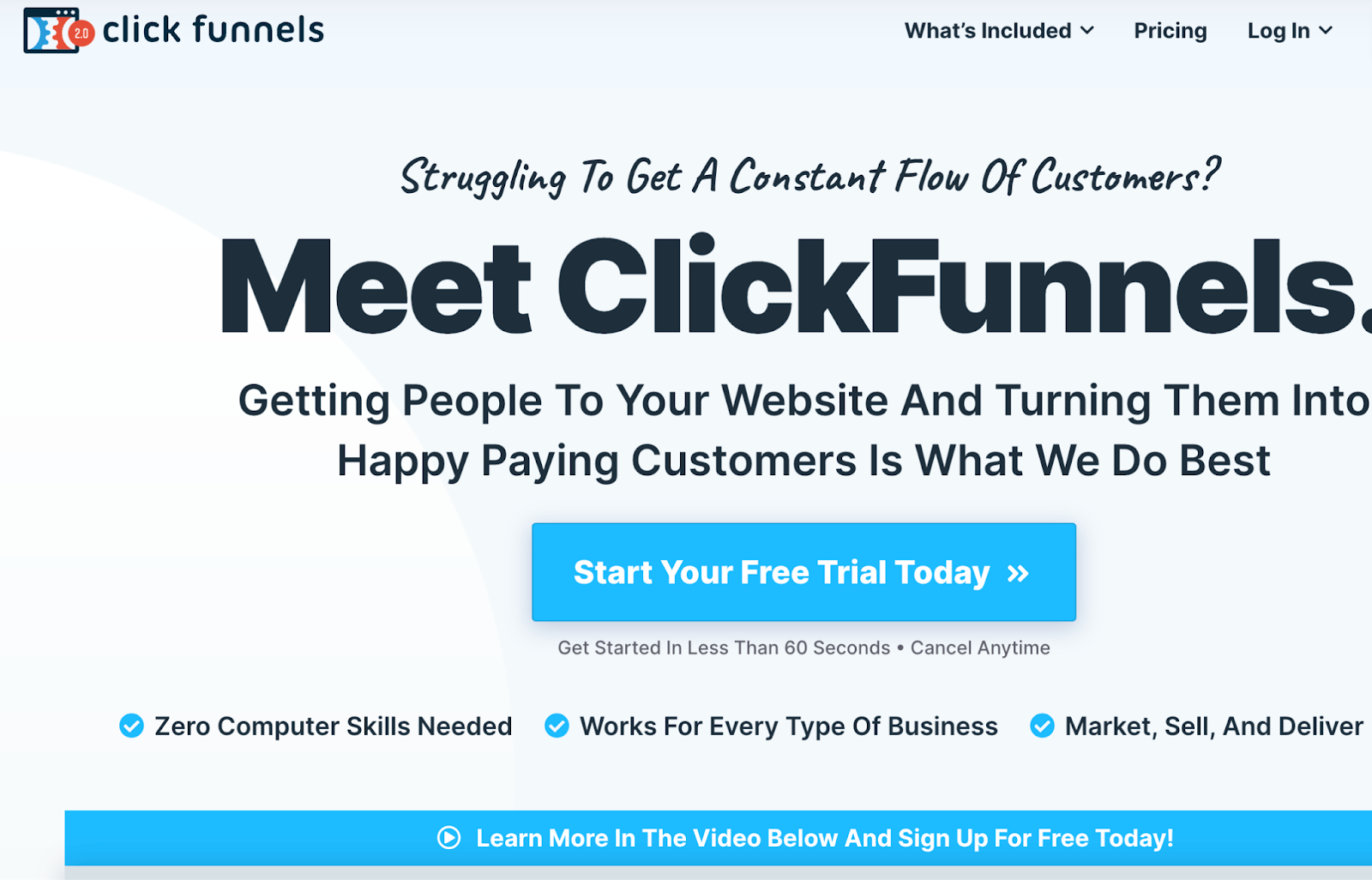
Perhaps one of the most famous names in online funnel-making and digital products, ClickFunnels is one of the original and most popular platforms for selling digital products.
Its specialty is conversion-based funnels that are typically in a long-form sales pages. The platform has an easy-to-use drag-and-drop builder for simple yet effective sales pages. There is an option to create and use templates, however, they are not as diverse or customizable as many other alternatives.
The step-by-step funnel is a comprehensive solution that includes email marketing, upsell and add-on capabilities. Although it includes support, priority is given to users in the higher-paying brackets.
Clickfunnels integrates with many payment solutions including PayPal and Stripe.
Clickfunnels Pros:
High-converting sales pages that can be built quickly and complete with multi-step, customizable checkout pages that can be optimized with email marketing and upselling.
Clickfunnels Cons:
Expensive, with a somewhat limited builder when it comes to customization and themes–just about every sales page built with Clickfunnels looks alike. Limited support for basic users.
Clickfunnels Pricing:
$97 per month for a starter plan, $297 per month for the platinum plan, and $,2470 monthly for the Two Comma Club plan.
10. Samcart
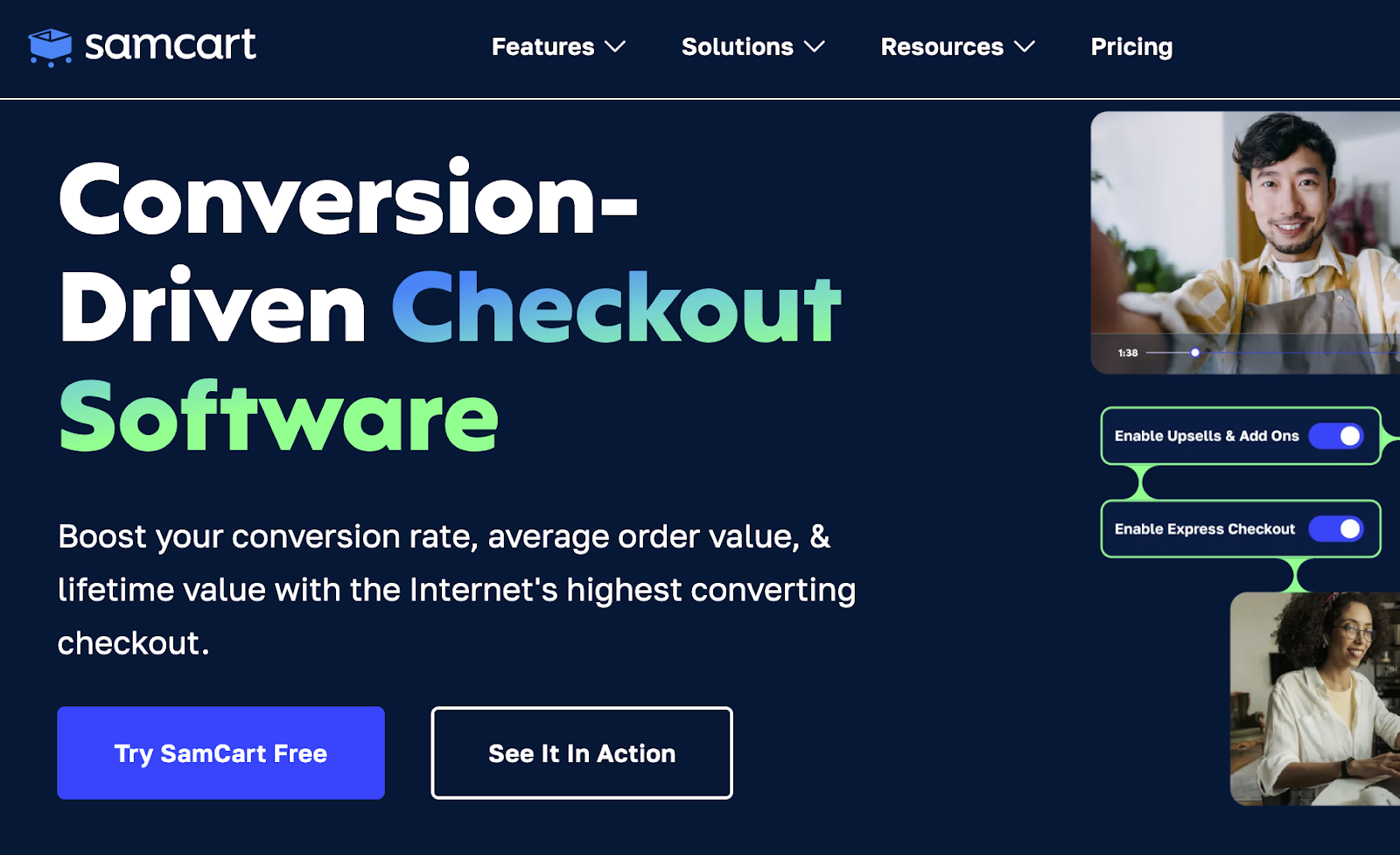
Samcart is software that is made with conversion in mind, and it can be used to create landing pages or checkout pages that can be used to launch or scale an ecommerce business.
The main focus of the platform is to simplify the sales process, taking the customers efficiently to the checkout page while keeping them engaged along the way.
Users can customize each step of the shopping and checkout process, and a dashboard reveals conversion-related statistics for each step throughout the process.
Samcart can be integrated with major email marketing services, payment gateways and membership sites, making it an option for those looking to optimize their current ecommerce business.
Samcart Pros:
High focus on conversion with optimized checkout pages, and a nice dashboard displaying relevant and rich statistics. Integration support for current store owners.
Samcart Cons:
Limited design capabilities, lacking full online store or shopping cart functionality as it is not a comprehensive standalone solution.
Samcart Pricing:
$49 per month for a basic Launch plan, and $99 per month and $199 month respectively for the Grow and Scale plans which have more features including custom checkout fields.
Picking the Right Ecommerce Platform
When picking an ecommerce platform, you’ll want to have some key characteristics in mind if you want to choose the right platform to build your business on.
Here are some of the most notable to keep in mind when making a choice:
- Easy to use
Especially if you’re a beginner, but even if you are an experienced ecommerce store builder, you will want to work with software that is easy to use so you can build exactly what you envision without needing to hire outside help or encounter any confusion or any unnecessary friction. - Good support and documentation
No matter how easy something might be to use, questions are inevitable, as are potential bugs or downtime. Whenever something happens that isn’t ideal, you will need to contact support that is ideally both highly responsive and helpful. It is also nice to have clear and easy-to-follow documentation to refer to that can eliminate the need for contacting support altogether. - Pleasant and easy user experience
Your customers are the ones making the choice when it comes to handing over their money to buy your product and generate revenue, and their decision can be influenced greatly by how pleasant and easy it is to navigate your online store and to make purchases. - Fairly priced
While it’s generally true that you need to pay for quality, there is no need to overpay or choose a solution that might be limited or lacking in features that a more cost-effective option has. - Infrastructure with scale potential
Even if you don’t start off with massive sales volume in the beginning, it’s a good feeling to know that you have chosen a solution that will grow to meet your needs as you evolve. Flexible and cost effective plans and features that change as you scale are ideal.
Selling Online With Whop
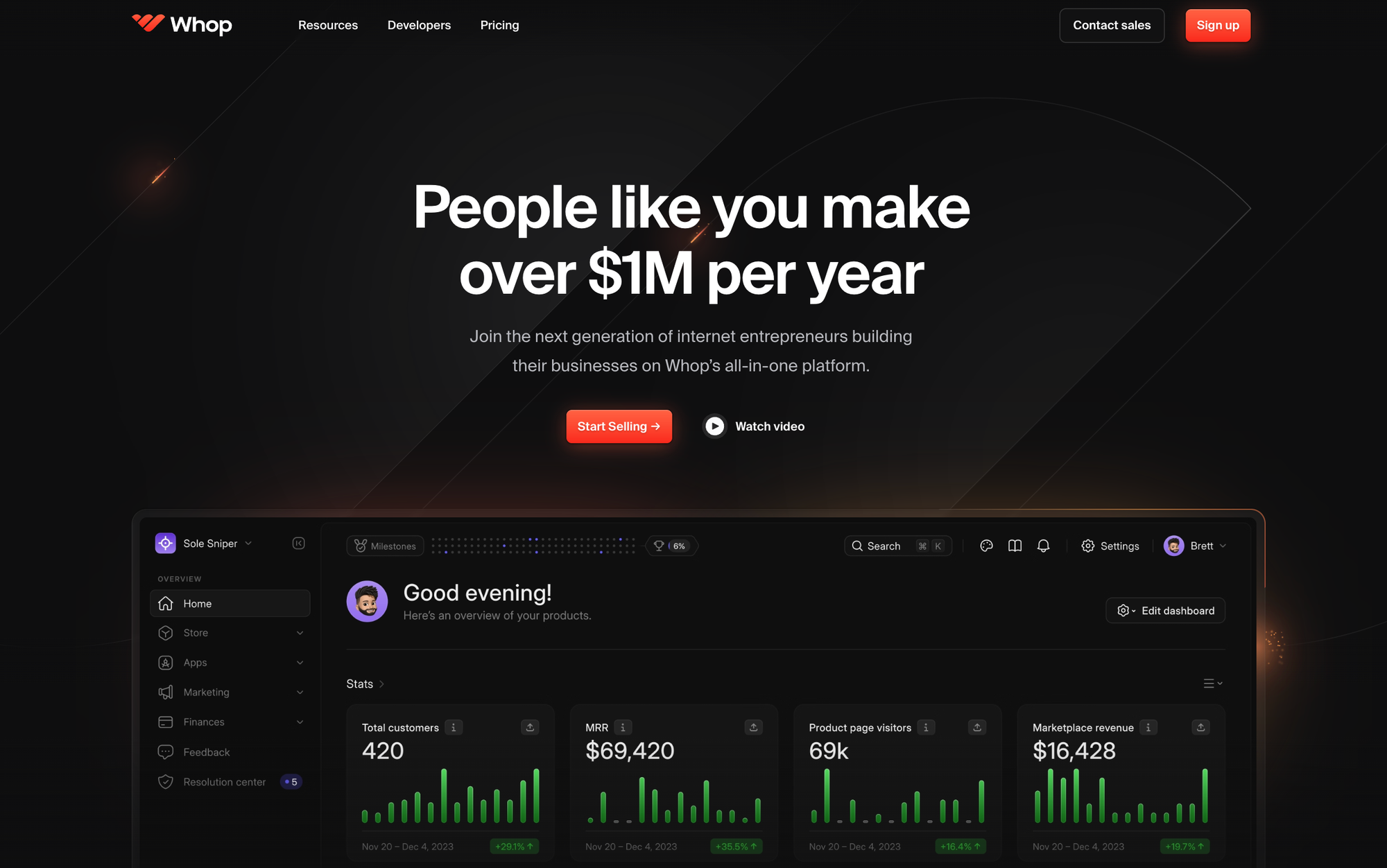
Complete with support for a vast array of digital products, a thriving marketplace and a simple yet effective store builder, Whop is a go-to solution for both the newest and most experienced ecommerce veterans.
Whether you’re selling a Discord membership, an eBook, online course, or SaaS, Whop makes it easy to launch a store that will showcase the best of your product and gain customers with a high converting page. Signing up as a seller is totally free and takes less than 10 minutes, and once you’re live, you will benefit from exposure to the active marketplace of targeted customers.
If you want to join the fast-growing group of savvy entrepreneurs using digital products to cash in with their ideas, launch your business on Whop today!





